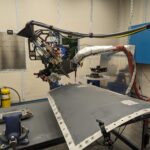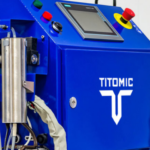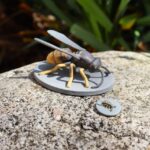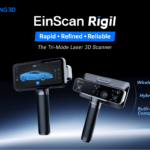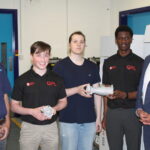Kawasaki Robotics has introduced Astorino, a new educational robotics platform aimed at providing industrial and technical education providers with hands-on experience in programming robots. Designed with affordability, flexibility, and safety in mind, Astorino offers the same capabilities as a modern industrial robot but at a fraction of the cost, making it an accessible tool for educators.
Astorino is designed to help students build foundational skills in robotics, enabling them to program a robot that operates similarly to Kawasaki’s industrial models. According to Kawasaki Robotics, learning to program Astorino will give students the capability to program any of the company’s robots.

3D Printing for Lightweight and Safe Design
A key feature that sets Astorino apart from traditional educational robots is its 3D-printed construction. Weighing just 12 kg (26.4 lb.), Astorino is much lighter than standard robots, and its 3D-printed body helps keep production costs low. Powered by stepper motors rather than the servo motors found in industrial robots, Astorino is designed specifically for educational settings where safety is a primary concern.
“This robot isn’t designed to perform automated tasks but to serve as a teaching tool,” explained Alexandre Boffi, Kawasaki’s manager of general industries. “Because it’s 3D printed and uses step motors, it’s much safer for students to handle and operate.”
The robot has a 1 kg (2.2 lb.) payload and is equipped with a six-axis system, mirroring the structure and programming environment of Kawasaki’s industrial robots. Students can safely learn to program complex robotic movements and operations with a system that behaves like a larger industrial model without the same safety risks.
At a base price of $5,000, Astorino is much more affordable than other educational robots, allowing schools and universities to purchase multiple units. This affordability increases student engagement, as more students can have direct interaction with the robots during lab sessions.
“With Astorino, instead of having one robot for an entire class, educators can now purchase several units,” Boffi said. “For the price of one industrial robot, you could get up to five Astorinos, giving students more time with the equipment.”
Kawasaki’s goal with Astorino is not to compete with larger manufacturers of educational robots but to create a more accessible and flexible platform. The robot is powered by a 110V outlet and can easily adapt to different classroom environments.

Customization and Open Architecture
Astorino also offers high levels of customization, an essential feature for educational settings. Kawasaki provides students with STL files for 3D-printed replacement parts, allowing them to fabricate new components if needed. “If a part breaks, students can print a replacement themselves,” Boffi noted. “Or, an educator could build the robot with students in one semester and then teach them how to program it in the next.”
Additionally, the platform supports various customization options, such as grippers, IO modules, and external sensors, giving educators the flexibility to tailor the system to their teaching needs. The robot’s stepper motors ensure safe operation, particularly for younger students, and its lightweight design makes it suitable for a wide range of educational environments.
Broadening Access to Robotics Education
Kawasaki is targeting educational institutions with Astorino, aiming to address the growing need for hands-on experience in robotics. According to the College Board, there are currently over 174,000 robotics engineering jobs in the U.S., with that number expected to grow by 6.41% in the next five years. As manufacturing evolves, students will need practical robotics experience to remain competitive in the job market.
Astorino offers a solution to this challenge by providing an affordable, safe, and adaptable platform that educators can use to teach foundational robotics skills. Kawasaki also plans to expand the platform’s capabilities by offering a seventh axis and exploring additional end effector options.


